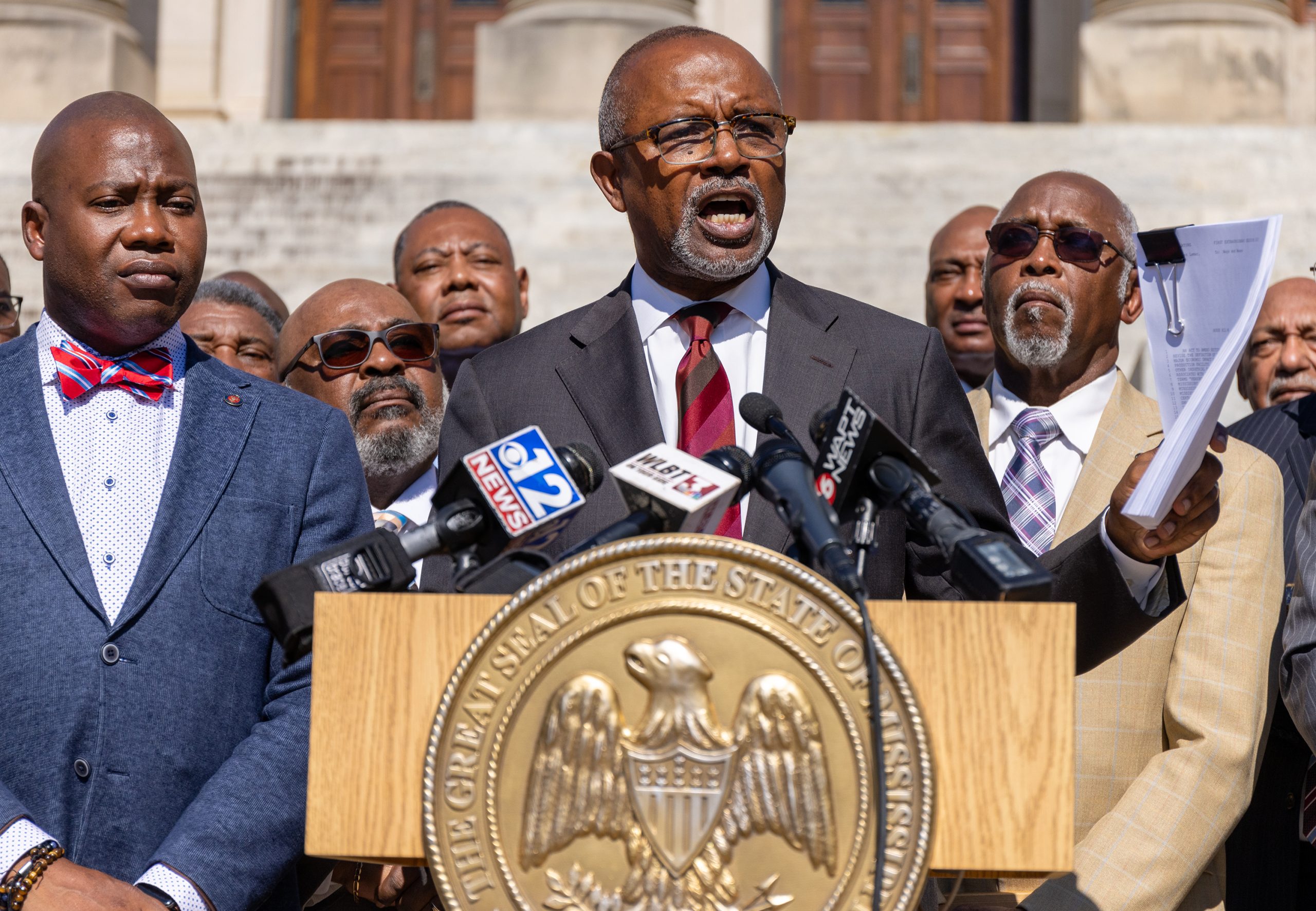Mississippi Today
Transcript: Democratic leaders respond to 2023 State of the State address

Transcript: Democratic leaders respond to 2023 State of the State address
Rep. Robert Johnson and Sen. Derrick Simmons, the House and Senate Democratic leaders, responded to Gov. Tate Reeves' Jan. 30 State of the State address.
Below is the statement from Johnson and Simmons.
Editor's note: This transcript was submitted by the leaders' staff and has not been formatted to match Mississippi Today's style.
The Mississippi described in today's State of the State is not the Mississippi lived in by the vast majority of our state's families. It is a fantasy — a mythical Mississippi that we all wish we lived in. A booming economy; well-funded and high-performing schools; accessible, high-quality healthcare; economic opportunity for all; functioning infrastructure – it sounds pretty magical.
And it might as well have started with “once upon a time.”
As much as we'd like to believe in this fairy tale, for the rest of us, our Mississippi is a much different story.For many Mississippians, the reality is that our state isn't working for us, it's working against us. And far too often it feels like this place that we love so much doesn't love us back. What's most frustrating, though, is that not only do state leaders refuse to acknowledge your concerns and do their part to improve your lives — they're ignoring our state's issues outright, while telling us over and over again just how great everything is.
According to the most recent census, Mississippi was one of only three states that lost population over the last ten years — a decade that saw Gov. Reeves running the state Senate for two terms as lieutenant governor, where he decided on spending and slashing and what would be prioritized or ignored. But as we watched our kids and grandkids flee, our colleagues and friends leave for greener pastures, we listened to state leaders — including Tate Reeves — tell us that Mississippi was on fire, the state's coffers were filling up, and that brain drain was just a figment of our collective imagination.
Tonight, again, we heard those same refrains and the same downplaying of the realities of life here in our state.
Since last year's State of the State address, the healthcare crisis has reached a critical point. But while we have sounded the alarm, Republicans have neglected to extend postpartum Medicaid coverage for new moms; refused to prioritize sending money to rural hospitals; and continued to ignore the pleas of voters, advocates, policy experts, hospital leaders, and business leaders to expand Medicaid. We've been warned by the Department of Health there's a growing area of the state in which there is no hospital to deliver a baby and we are navigating a severe nursing shortage.
Thirty-eight rural hospitals are in danger of imminent closure — that's 54% of Mississippi's rural hospitals. More than 200,000 working Mississippians are without healthcare. One in six women of childbearing age is uninsured. 46,000 Mississippi children are uninsured. The only neonatal intensive care unit in the Delta closed this year, where there is one pediatrician for every 4,000 children. We are number one in the nation for babies born with low birthweight. We have the nation's highest fetal mortality rate. Our preterm birth rate rose to 15% from 14.2% the year prior. And just in case you thought this was an issue that only affected one portion of the state, you should know that preterm birth rates worsened in Harrison County, Rankin County, Jackson County, and Madison County.
Meanwhile, while they continue to insist there's “more to being pro-life than anti-abortion” the governor and the party he leads have only made excuses for their inaction and vague promises that we have no reason to believe they will ever deliver on.
Gov. Reeves also continues to say that he'll keep fighting to eliminate the income tax. The revenue from the state income tax accounts for a third of our general fund — the portion of the budget that takes care of the most basic services you expect the government to handle. Things like education funding and money for roads and bridges come from this portion of the budget.
Tonight, the governor told us, again, that “Mississippi continues to be in the best financial shape in its history.” And yet, 30% of Mississippi children are living in poverty. The Department of Mental Health's workforce has decreased by nearly 4,000 since 2009. State employees – the men and women who keep our state running – are, on average, paid thousands of dollars less than their counterparts in all of our surrounding states. Our state's schools have been underfunded by over $3 billion since 2007.Our long-neglected roadways continue to cost Mississippians, on average, $800 in vehicle damage annually.
If Mississippi has never been in better financial shape, how do you explain how many Mississippians are struggling to make ends meet? How are our schools still struggling to provide the basics for our students? How did our capital city go without water for weeks this year?How is our healthcare system on the brink of total collapse?
The fact is, it is not a lack of available funds that stops leadership from keeping its promise to the citizens they pledged to serve; it is a lack of interest. Slashing the budget and limiting government spending does, in fact, come at a cost. A human cost. Democrats are often criticized for just wanting to throw money at a problem, but that's not what we're doing here. There has to be a shift in the way we think about funding government services. It's not just about spending money. It's about investing in Mississippi, in Mississippians – and in the future of our state.
House and Senate Democrats have long offered up concrete ideas and common-sense solutions to move Mississippi forward. Year after year, we've authored legislation to address the increasingly dangerous healthcare crisis, raise the minimum wage, fix our state's crumbling infrastructure, fully fund public education, make voting easier and more convenient, increase transparency in government, ensure equity in economic development so that all corners of our state have the opportunity to flourish, and now we're working to restore the ballot initiative. We also led the charge on increasing teacher pay and a raise for state employees year after year — and not just when it was politically beneficial to do so. Today's speech, like most of what comes out of the governor's mouth, was not reflective of what it's like outside the gates of the Governor's Mansion; it was yet another audition to be someone's running mate. He's continued not to take his cues from what he's hearing from you; but from what he knows will remind the producers at Fox News that he's always available for a booking.
We wish that we could go along with the fairytale spun about the state of our state, but the truth is far more complicated than everyone living happily ever after. We have real work to do. The good news is, we know how to get started on making things better for all of us.
Mississippians share more values and principles than not. We care about what happens to our neighbors because that's just who we are. We want our families to prosper and for our kids to have a better future and more opportunities than we did. But actions speak louder than words, and it seems that Tate Reeves only wants you to believe that he shares those values.
Our state is in desperate need of a leader who sees all of that and governs based on it — someone who brings people together, someone who will acknowledge the problems we face and try to understand the causes of them. We need a governor who has respect for his fellow Mississippian, someone who will lead with honesty and empathy and compassion, and who can make the best decisions for everyone, not just a select few. We need someone who can not only hear people but listen to them. We need someone who will wake up every single morning and get to work on improving this state.
Most of all, we need someone with the guts to stand up and say, “Enough is enough, it's time to make Mississippi a better place. For everyone.”
We can do better. And if we want our kids and grandkids to have a fighting chance, we're going to have to.
This article first appeared on Mississippi Today and is republished here under a Creative Commons license.
Mississippi Today
At Lake High School in Scott County, the Un-Team will never be forgotten
They were the 1974 Lake High Hornets football team, 29 players strong. But in Scott County, right there just off Highway 80, they are forever known, for good reason, as The Un-Team.

That's “un” as in: undefeated, untied, un-scored upon, and virtually un-challenged. The Hornets, coached by Granville Freeman, a maniacally demanding 26-year-old in only his second year as a head coach, out-scored opponents 312 to zero over 10 games. No opponent came within three touchdowns of Lake. This was before Mississippi had statewide high school football playoffs, but Lake was the undisputed champion of the old Cherokee Conference. The Hornets won the south division and were supposed to play French Camp for the league championship. Apparently, French Camp decided that discretion really is the better part of valor and declined to play.
Fifty years later, looking at the scores, it is difficult to blame them.
The 1974 Lake High School Un-Team
Undefeated, un-tied, un-scored upon
Lake 18 | Choctaw Central 0
Lake 20 | West Lauderdale 0
Lake 40 | Stringer 0
Lake 30 | Beulah Hubbard 0
Lake 54 | Sebastopol 0
Lake 42 | Hickory 0
Lake 20 | Scott Central 0
Lake 30 | Nanih Waiya 0
Lake 20 | Clarkdale 0
Lake 38 | Edinburg 0
Lake 1 | French Camp 0 (forfeit)
Twenty-six of the 29 Lake Hornets are still living, and all 26 will be back in Scott County this Saturday night to be honored by the Scott County Sports Hall of Fame at Roosevelt State Park. They will come from nine different states and one will return home from Germany. They wouldn't miss it. Would you?
Said Freeman Horton, the team's best player, who later was a four-year starter at Southern Miss, a longtime coach, and now lives in Horn Lake, “We achieved something back then that can never be surpassed. Some other team, somewhere, might tie our record, but I doubt it. One thing's for sure, they can't beat it. There's no way.”
Coach Granville Freeman was an old school coach in some ways but decades ahead of most high school coaches in so many others, as we shall see. “When I went to Lake in 1973, I told them we would have a team that when opponents got ready to play us, they would be shaking in their shoes,” Freeman said. “I'd say we accomplished that in 1974.”
Old school? Lake ran out of a straight T-formation, nothing fancy. The Hornets played a standard four-man front defensively. Freeman demanded all-out effort, all the time. He drove the team bus to practice 5.3 miles away from the school. After what was usually a long, tortuous practice if he wasn't satisfied with the effort or performance, he followed in the bus, lights on, while the players ran all the way back to the high school. If they were going too slow, he'd rev the engine. If that didn't work, he might even bump a straggler's rear end.
“You couldn't do that these days, could you?” Freeman said, chuckling. “I'd need a really good lawyer.”
He would also have needed a jury made up of avid Lake football fans who knew there was method to his madness.
There's no doubt Freeman worked at least as hard as his players. Said Harry Vance, the team's quarterback, “Coach was 25 years ahead of everybody else in the way he used film and developed scouting reports. By the time we met as a team after church on Sunday, he had graded Friday night's film and had a 20-page scouting report prepared and printed on the next opponent. It was only Sunday and we already knew everything we were going to do.”

Said Vance of his coach, “He coached 24 hours a day, seven days a week. And he was crazy smart.”
Horton, who starred as an outside linebacker on defense and left tackle on offense, was widely recruited. Mississippi State, Ole Miss and Southern Miss all offered scholarships. So did Bear Bryant at Alabama, and this will tell you much about Granville Freeman's crazy intellect. Bryant and Ken Donahue, his top recruiter, visited Lake to recruit Horton. Freeman was discussing Horton with Bryant and Donahue after practice when Donahue asked, “Coach, I don't understand why you don't you play your best athlete at middle linebacker? At Alabama, Horton would be playing in the middle.”
Responded Freeman, “Well, Coach, I'll tell you why. If I line up Horton in the middle, I don't have any idea which way the other team is gonna run. But if I line him up one side, I know for damn sure which way they ain't about to run. This way, we only have to defend half the field.”
Freeman says he looked over at Bryant. The legendary, old coach was chuckling, as he told Donahue: “Well, now you know, Coach, makes a whole lot of sense to me.”
Many in Lake thought Freeman really had lost his mind during the spring of 1974. That's when he called his players together and told them summer workouts would be different that year. Twice a week, a ballet teacher was going to come from Jackson and work them out in the gymnasium. Yes, they were going to take ballet lessons, and they would each pay for the lessons. “We thought Coach Freeman was nuts when he told us about it,” said Dewey Holmes, the team's star running back who rushed for more than 1,200 yards. “But we all did it.” These weren't rich kids, mind you. Many of the Lake players picked up aluminum cans on roadsides to earn the money to take ballet.
It made all kinds of good sense to Freeman. “Ballet is all about balance, about footwork, about flexibility and core strength,” Freeman said. “I thought it was perfect training for a football player. We called ourselves the twinkletoes Hornets.”
A lot of folks laughed when they heard about it. They weren't laughing a few months later, not after 312-0.
And nobody was laughing in the locker room at halftime of a game at Hickory. Lake led only 7-0 and Freeman was furious. So, he yanked the helmet off one player and threw it through a window. “I surprised myself with that,” Freeman said. “I thought, ‘Now, I've done it.'”

So he did it some more. He grabbed more helmets, threw them through more windows. Final score: Lake 42, Hickory 0. Of course, Hickory wanted those windows fixed and when the bill arrived, Lake Hornets fans raised the money to pay.
Another time, after a scoreless first half with Stringer, Lake players feared what would happen in the locker room. They expected another tirade. Instead, Freeman walked in and told them he was so disgusted he was quitting on the spot. So, he walked out of the locker room and took a seat in the stands. And that's where he was when the Hornets returned to the field and proceeded to score 40 straight points.
Many readers might wonder what happened to Granville Freeman, so wildly successful, so early in his coaching career. Answer: Four years later, he retired from coaching at age 30 with a 57-2-1 record.
Why? Burnout was surely one reason, and there were at least 485 more. His last monthly paycheck at Lake was for $485. Said Freeman, I did the math and figured out what I was making per hour. I was coaching the junior high and high school teams, mowing and lining the fields, watching film, carrying it to Jackson to be developed, doing scouting reports, washing uniforms, running the summer program, teaching, driving the bus. It came out to 17 cents an hour. I wasn't sleeping much.”
As many coaches in Mississippi have, Freeman stopped coaching and started selling insurance. Fourteen years ago, when he explained the reasons for his his early retirement from coaching, the interview was interrupted when someone knocked and slipped a payment under the door of his State Farm office. Freeman never missed a beat, laughing and telling this writer, “You know, that right there never happened back when I was coaching.”
Now 77, he has retired also from State Farm. The insurance money was far better in those later years but nothing ever happened to come close to the satisfaction of that unparalleled autumn half a century ago.

Undefeated. Un-tied. Un-scored upon. Perfect. That's why all 26 living players are coming back. That's why end Dexter Brown is traveling from Frankfurt, Germany, to take part. That's why Holmes, the star running back who later rose to the rank of full-bird colonel and traveled the world in the U.S. Air Force, is coming from his home in Tucson, Ariz.
“We grew up together, we achieved together,” Holmes said. “I wouldn't miss this.”
So many stories will be told, none more than what follows.
Nobody had come really close to scoring on the Lake Hornets until the final game, when a fourth quarter fumbled punt gave Edinburg the ball at the Lake 8-yard line. Three plays later, the ball was still on the 8, and Edinburg, trailing 38-0, lined up for a field goal. Moochie Weidman, the Hornets' nose guard who might have weighed 140 pounds, broke through the center of the line so quickly he blocked the kick with his chest.
How did it feel, someone asked Moochie, after he regained his breath. He answered with a grin. “It hurt so good,” he said.
Freeman Horton says it remains probably his favorite memory of that un-season. “Moochie was our smallest guy, the one you'd least expect, and he was the hero,” Horton said.
Sadly, Moochie Weidman is one of the three deceased 1974 Lake Hornets, but he will be remembered, ever so fondly, Saturday night.
This article first appeared on Mississippi Today and is republished here under a Creative Commons license.
Mississippi Today
On this day in 1959
April 25, 1959

Days before his scheduled trial, Mack Charles Parker, a 23-year-old Black truck driver, was lynched after midnight by a hooded mob of white men in Poplarville, Mississippi.
Parker had been accused of raping a pregnant white woman and was being held in a local jail. A deputy reportedly unlocked the jail, enabling a white mob to enter Parker's cell. The mob dragged Parker head first down the stairs, leaving a bloody trail. The mob then beat him, took him to a bridge, shot and killed him, then weighed his body down with chains and dumped him in the river.
FBI agents identified the jailer, Jewel Alford, as giving the mob the keys. Another alleged participant was J.P. Walker, elected sheriff of Pearl River County four years later. Other suspects included “Crip” Reyer, L. C. Davis, “Preacher” James Floren Lee, his son James Floren “Jeff” Lee, Herman Schultz and Arthur Smith who supplied the names of Walker, Preacher Lee, L.C. Davis and the names of others who were in the two cars. Smith told agents that Lee, Reyer, Davis and Walker were in the lead car that carried Parker from the jail.
Howard Smead's book, “Blood Justice,” tells the story. Parker is among 40 martyrs listed on the Civil Rights Memorial in Montgomery, Alabama, and is also listed at the National Memorial for Peace and Justice.
This article first appeared on Mississippi Today and is republished here under a Creative Commons license.
Mississippi Today
Senate votes to restore voting rights to four people previously convicted of disenfranchising felonies
The state Senate on Wednesday agreed to restore voting rights to four people who have completed their prison sentences and paid restitution for disenfranchising felony convictions.
“I think we all have failed at some point in our lives,” Democratic Sen. Juan Barnett of Heidelberg said on the Senate floor. “I think we all have asked for forgiveness. And these individuals now who are before us on these suffrage bills are asking us to forgive them of those things.”
The GOP-majority chamber overwhelmingly approved the bills, and they now head to the House for consideration.
Sen. Mike Seymour, a Republican from Vancleave, was the only person in the 52-member Senate who voted against all of the suffrage restoration bills. Reporters attempted to ask Seymour why he opposed all of the suffrage measures, but he churlishly walked down three flights of stairs without substantively answering the questions.
The only thing he said in response to the media's inquiries was a cryptic and confusing remark that he believes “everybody should have the same right to suffrage.” He declined to elaborate what that meant and darted into an office.
The four people the Senate restored voting rights to were:
- A Newton County man who was released from prison in 1989 for escape, burglary and larceny convictions
- An Oktibbeha County man who was released from prison in 1997 on an embezzlement conviction
- An Oktibbeha County man who was released from prison in 1994 on a false pretenses-communications conviction
- A Walthall County man who was convicted of grand larceny in 1977; Lawmakers said the conviction occurred so long ago that the Mississippi Department of Corrections did not even have all of the documentation in its possession to show how many years he served and when he was released from custody.
Senators voted down a bill to restore voting rights to a Yazoo County man who was convicted of possessing stolen goods and attempted armed robbery in 1995. He was released to parole on September 16, 1997, and discharged on February 13, 2000.
Sen. Walter Michel, a Republican from Ridgeland, and Sen. Chad McMahan, a Republican from Guntown, told reporters they voted against restoring suffrage to the Yazoo County man because they believe attempted armed robbery is a violent crime, and they oppose restoring voting rights to people convicted of violent crimes.
“If you put a gun to somebody's head or somebody murders somebody, then I'm going to vote against restoring suffrage,” Michel said. “But if they stole some money, and it was 35 or 40 years ago, I'm fine with that.”
A senator held the defeated measure on a procedural measure, so the chamber could reconsider the issue at a later date.
The Senate's decision to reject an effort to restore suffrage to the Yazoo County man comes a week after Kenneth Almons, a Jackson resident who was convicted of armed robbery and aggravated assault at 17 years old, testified before a legislative committee.
At 51, Almons has run his own business, currently works for the city of Jackson, has raised three children and has not been convicted of any other crime for nearly three decades.
Lawmakers who attended the hearing asked Almons, who served five years in state prison, what it would mean if the state restored his voting rights.
“It would mean I'm no longer a nobody,” Almons responded. “And if you can't vote, you're nobody. And in the public's eye, I'm a nobody.”
Michel said he would advise Almons that he can attempt to persuade a lawmaker to introduce a suffrage restoration bill on his behalf and let the bill work its way through the state's lawmaking process.
Michel, who represents a part of Hinds County, said he would not be willing to introduce such a measure for Almons.
Senators authored around nine suffrage restoration bills, and Senate Judiciary B Chairman Joey Fillingane, a Republican from Sumrall, decided to bring five of those bills up for debate. Members of the committee voted to advance all five suffrage bills with no opposition.
The Senate bills will now head to the House for consideration where House Speaker Jason White will likely refer the measures to the House Judiciary B Committee for consideration, which is led by Rep. Kevin Horan, a Republican from Grenada.
Horan previously told Mississippi Today that he will not restore suffrage to people convicted of violent offenses or those previously convicted of embezzling public money. Additionally, Horan said people must have completed the terms of their sentence and not have been convicted of another felony offense for at least five years to be considered.
The committee Horan leads advanced 27 House suffrage bills out of the committee, but he has not presented them for consideration in the full House chamber. Lawmakers can debate suffrage bills until the final days of the 2024 session.
This article first appeared on Mississippi Today and is republished here under a Creative Commons license.
-
Mississippi News7 days ago
What this means for local schools
-
228Sports5 days ago
From Heartbreak to Hoop Dreams: Pascagoula Panthers Springboard from Semifinal Setback to College Courts
-
Mississippi News4 days ago
2 dead, 6 hurt in shooting at Memphis, Tennessee block party: police
-
Mississippi News7 days ago
Willis Miller sentenced to 45 years in prison, mandatory
-
Mississippi News4 days ago
Forest landowners can apply for federal emergency loans
-
Mississippi Today7 days ago
The unlikely Mississippi politician who could tank Medicaid expansion
-
Mississippi News6 days ago
Burnsville man arrested in Prentiss County on drug related charges
-
Mississippi News3 days ago
Cicadas expected to takeover north Mississippi counties soon






































